How to Cook Steak in a Pan (Perfect Recipe)
Jan 12, 2023, Updated Jul 05, 2024
This post may contain affiliate links. Please read our disclosure policy.
How to Cook Steak in a Pan (Perfect Recipe Guide) – If you want a restaurant-quality, perfect steak every time, you’ve landed on the right recipe. The most flavorful steak seasoned with kosher salt and freshly ground black pepper and cooked in olive oil, butter, garlic, and fresh herbs- the perfect juicy steak with a caramelized crust!
Serve steak with a beautiful salad, Classic Lobster Bisque Recipe (Easy), Crispy Brussels Sprouts Recipe, and Red Skin Mashed Potatoes.
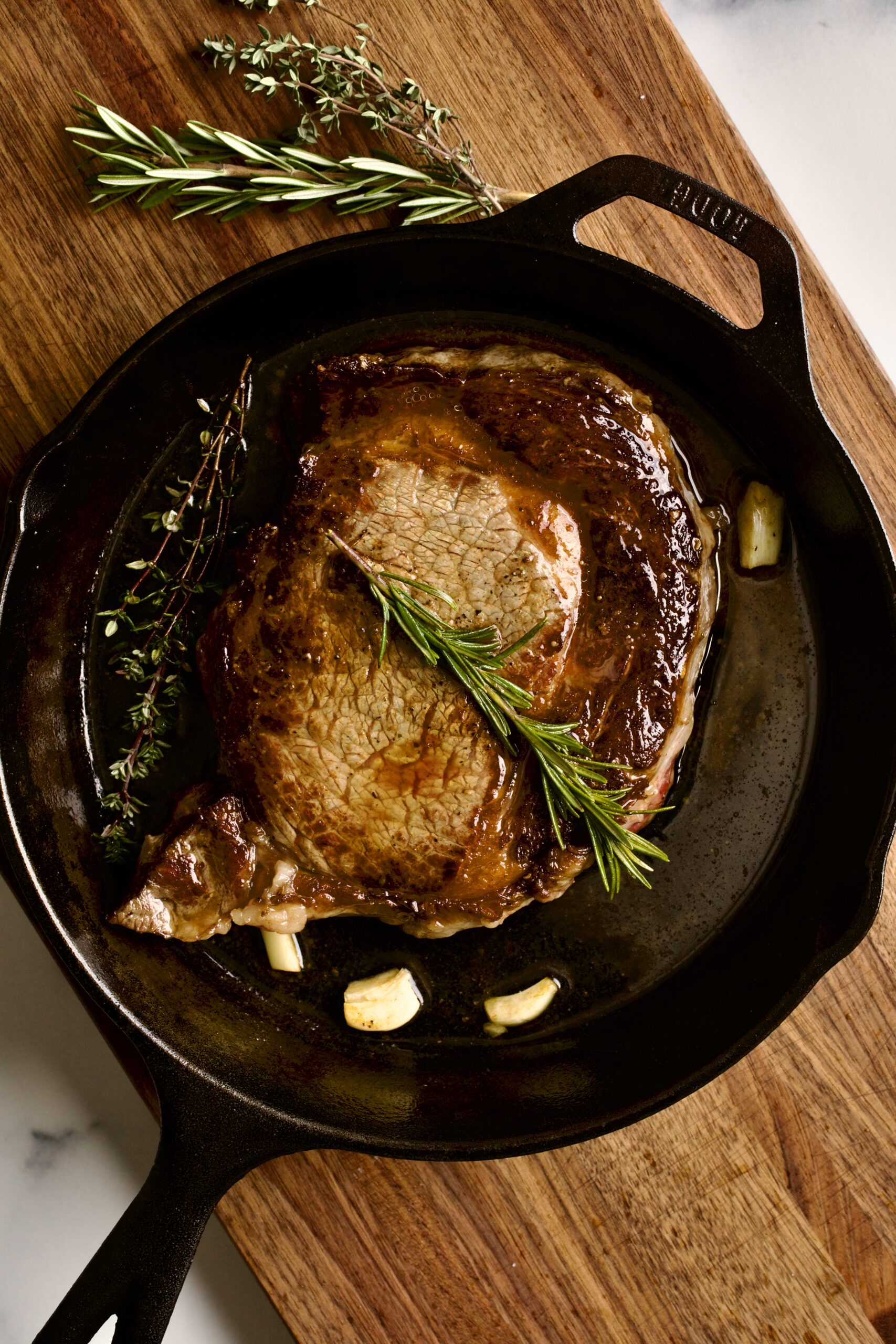
The Best Pan Seared Steak
Cooking the perfect steak is easier than you think. With this recipe guide, your steak won’t stick to the pan, get overcooked, or have you wondering- should I flip it yet? After making many mistakes, I’ve done the work for you, so you can achieve the perfect pan-seared steak whenever you want.
Get ready for a restaurant-style steak recipe all home cooks can enjoy. You’ll be surprised at how easy it is to make the perfect seared steak—perfectly caramelized on the outside with a juicy inside and a sensational butter, garlic, and herb sauce.
You will also love the following: How to Cook a Small Prime Rib Roast Recipe, Classic Italian Ragu Recipe (Meat Sauce), Roasted Beef Tenderloin, and BEST Italian Beef Short Rib Ragu.
Another steak recipe that you will also love is this Seared T-Bone Steak!
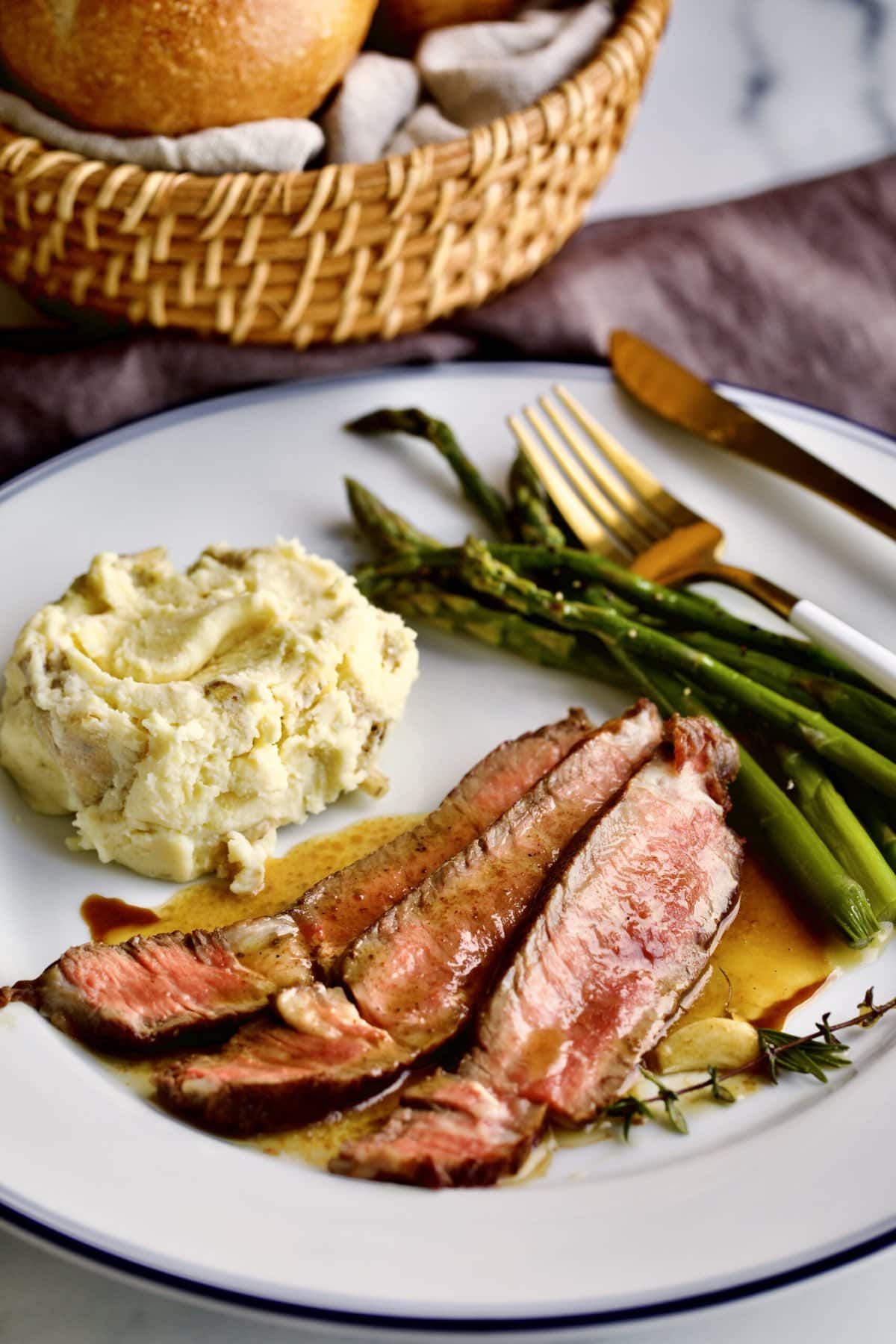
Table of Contents
- The Best Pan Seared Steak
- Simple Ingredients
- How to Season Steak Perfectly
- How To Pan Sear Steak
- Different Types of Steak
- Where to insert instant-read thermometer for steak doneness
- How Long to Cook Steak – Temperature Guide & Cooking Times
- Variations
- Best Equipment for Cooking Steak on a Pan
- Top Tips for Cooking Steak
- FAQs
- What to Serve with Pan-Seared Steak
- Pan Seared Steak Recipe
Simple Ingredients
There are only a few ingredients in this recipe so make sure they are of good quality for the best results. I recommend buying prime-grade or choice-grade steak.
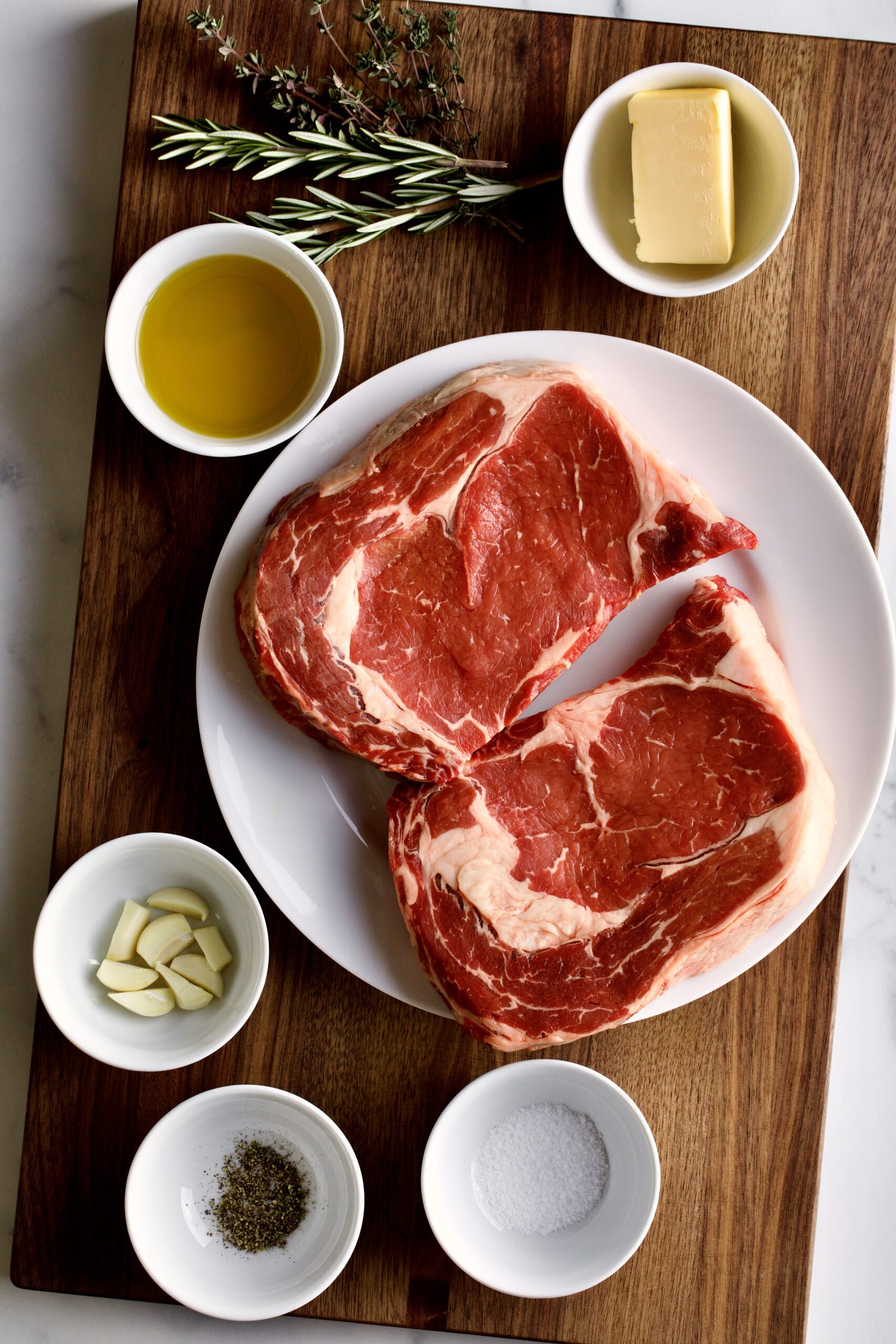
- New York Strip Steaks, Ribeye, or Top Sirloin Steaks (preferably choice or prime)
- 1 tablespoon extra light olive oil
- Kosher salt
- Black pepper, freshly ground
- Butter
- Garlic
- Fresh rosemary
- Fresh thyme
Recommended tools: digital instant-read meat thermometer or wireless meat thermometer.
See the recipe card for quantities.
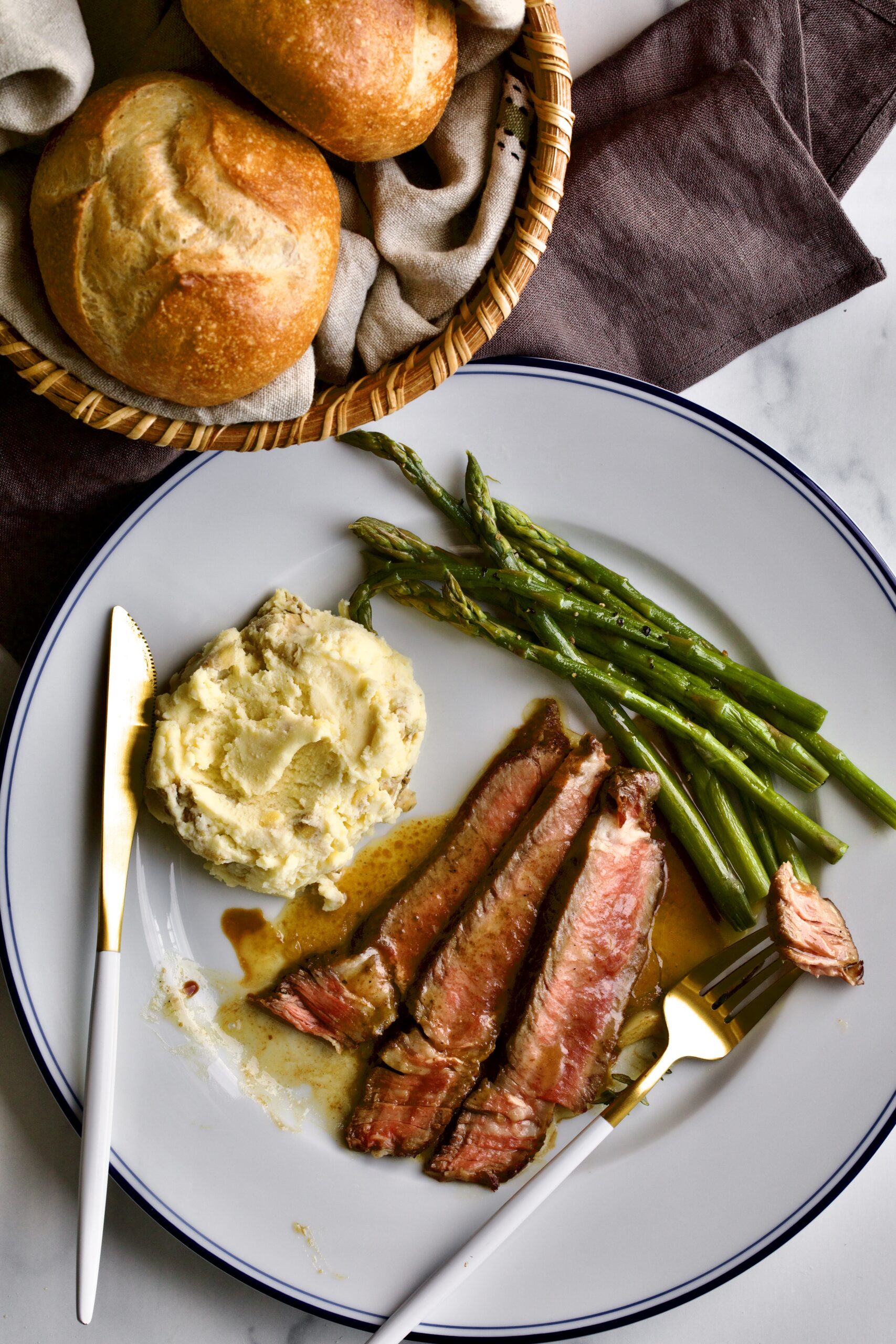
How to Season Steak Perfectly
When it comes to the perfect steak seasoning, I am a minimalist with a traditional salt and pepper method before cooking or grilling the meat because I add some fresh herbs sprigs when cooking in the pan. You can use the leftovers to make a steak version of this Prime Rib Sandwich!
Salt
The larger crystals create a tasty crust so you’ll want to liberally coat the steak with coarse or kosher salt. The meat will absorb the fine granules of table salt quickly, and you can over-salt the meat.
Salting the steak for one to two hours before cooking will tenderize the steak.
Either salt the meat a few minutes before cooking unless you salt it for more than one hour. Between those times, the salt will pull water out of the meat fibers and not give enough time to reabsorb back into the fibers.
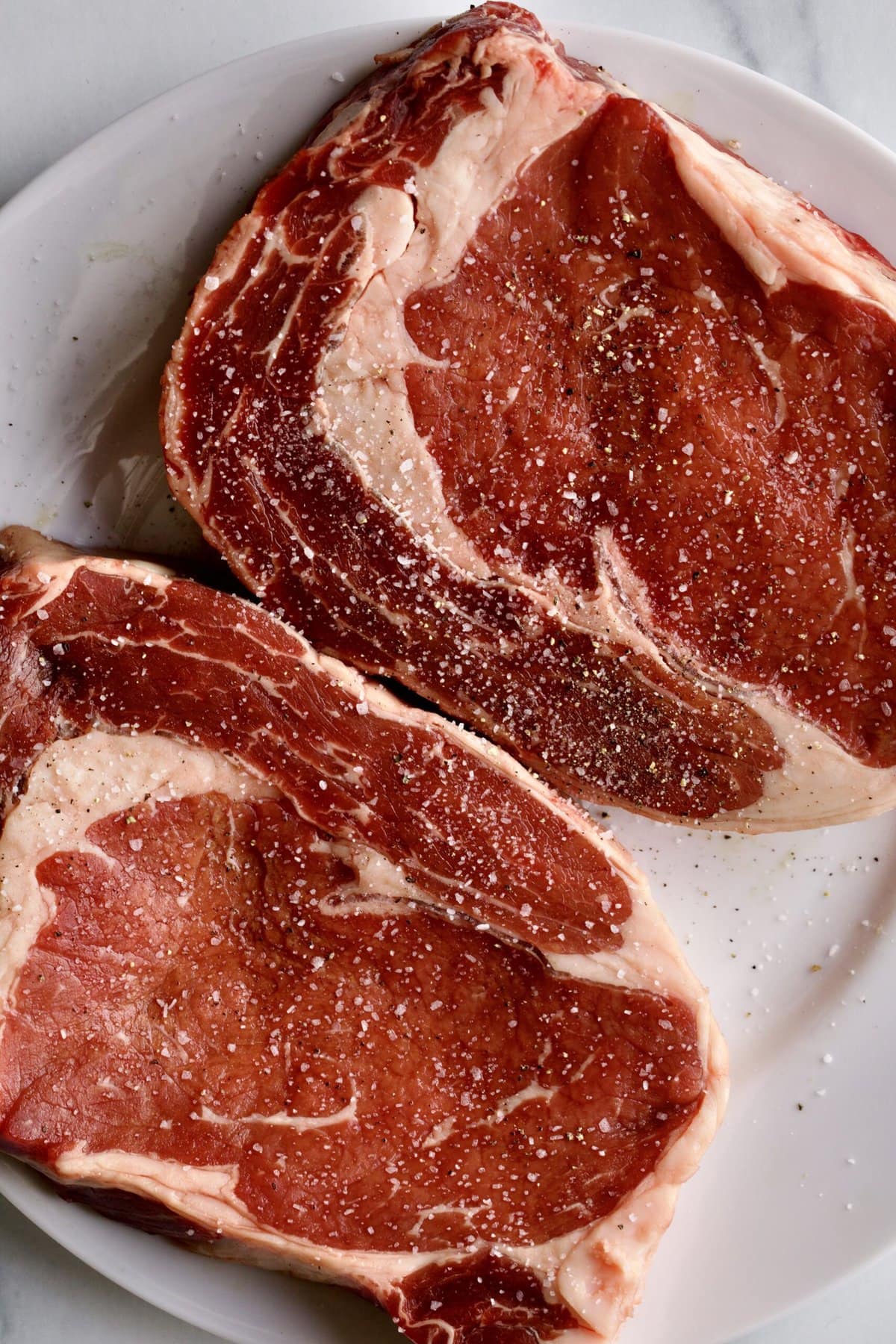
Pepper
A word of caution about pepper- pepper will carbonize and give a bitter flavor when used at very high temperatures. This can ruin your delicious steak!
If you are using my pan-searing method you can add the pepper before cooking your steak on the pan since it won’t reach 500 degrees F. If you are cooking steak on a fire or gas grill and it will touch an open flame, wait until AFTER you cook the steak to season it with pepper.
How To Pan Sear Steak
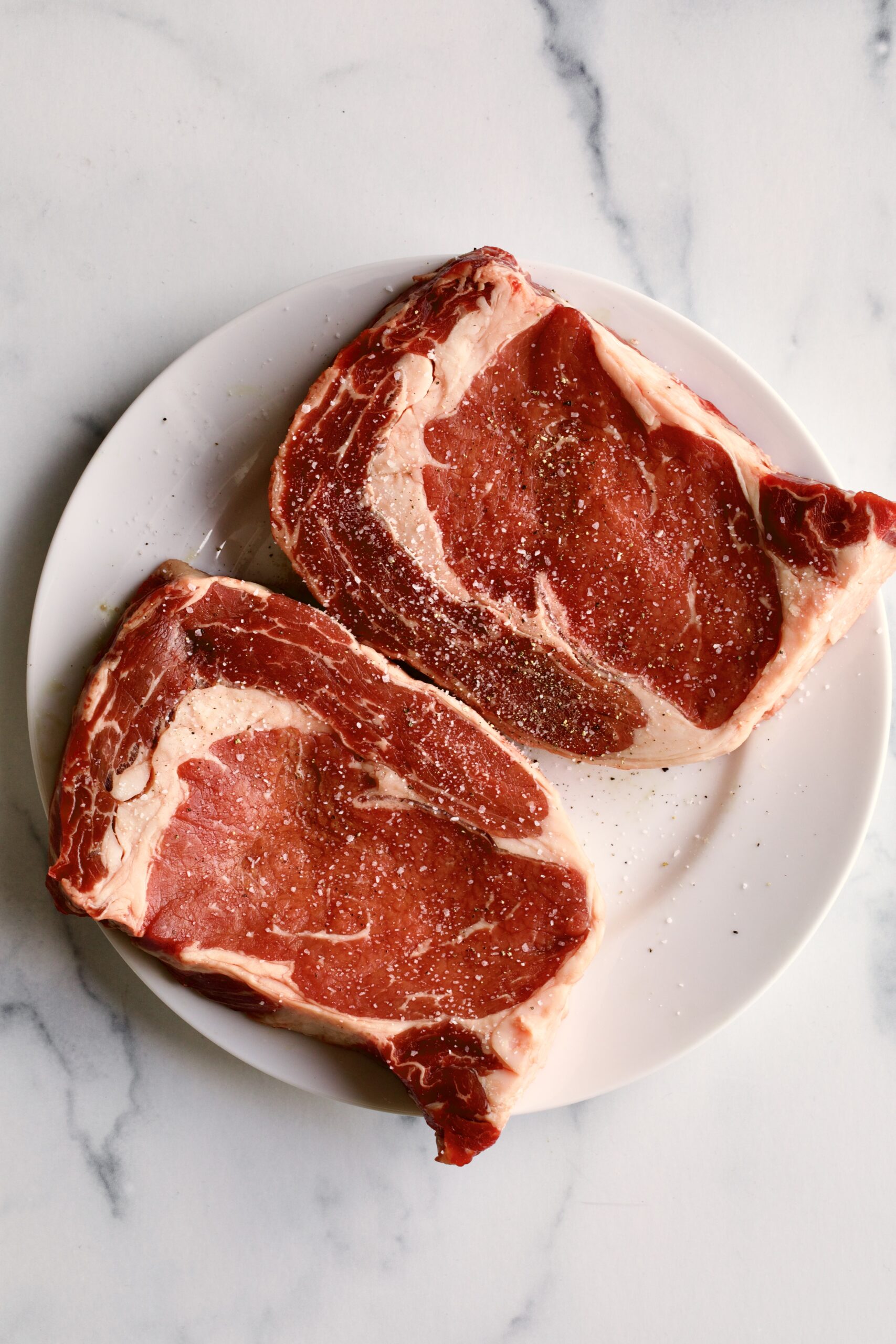
Rest the steaks at room temperature for 30 minutes. Thoroughly pat the steaks dry with a paper towel. Just before cooking, generously season with salt and pepper.
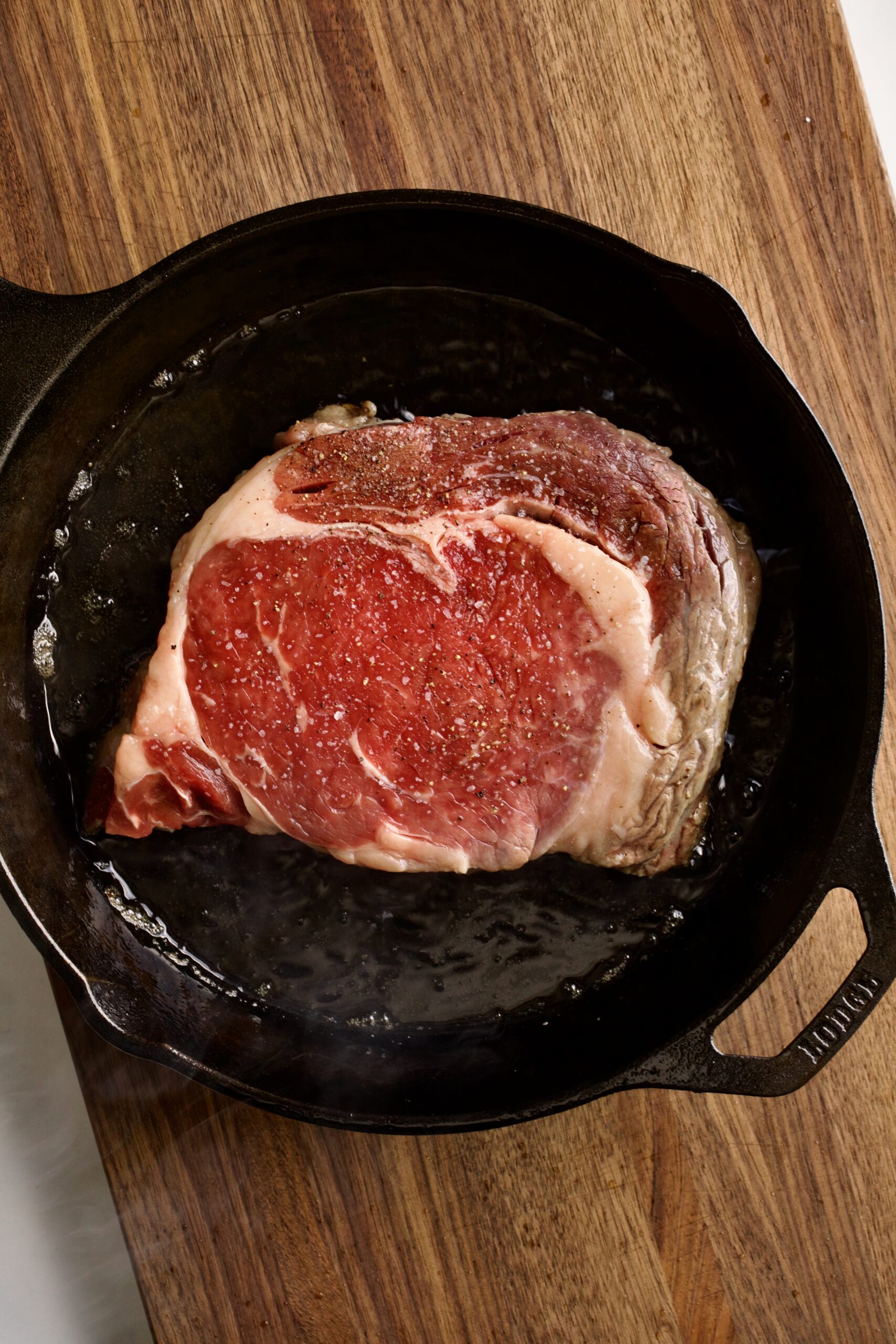
Heat the cast iron pan until hot, then add the olive oil over medium-high heat, swirling to coat the pan. Ensure the oil is hot before adding the steaks to the skillet. If using a smaller pan, cook steaks one at a time and use half of the butter, olive oil, and herbs for each one. Otherwise, cook in the same pan.
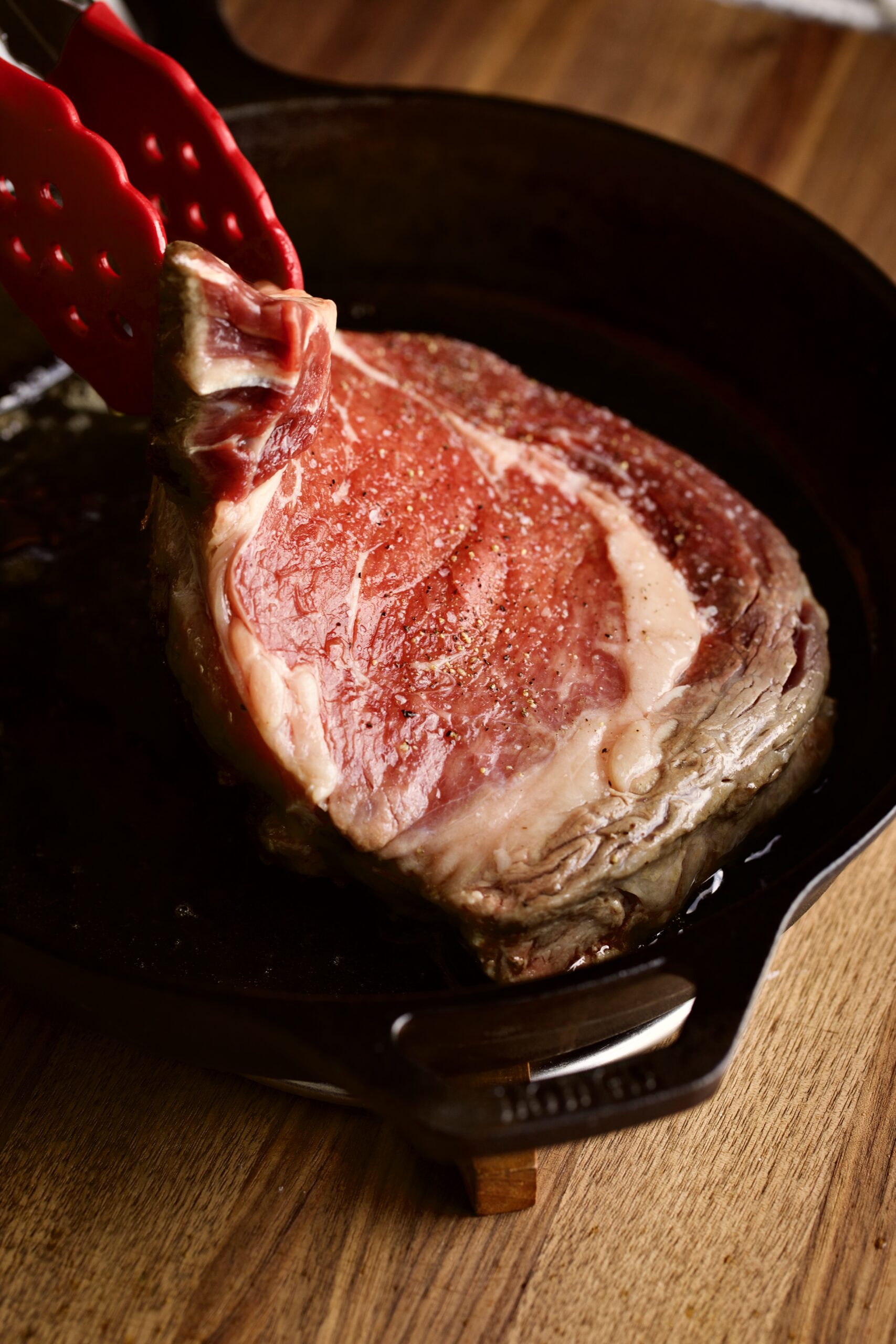
Sear the steaks on the first side for 4 minutes until a brown crust has formed, then flip and cook another 3-4 minutes. Using tongs, turn the steak on its sides to sear the fat edges and sides of the steak (1-minute per edge).
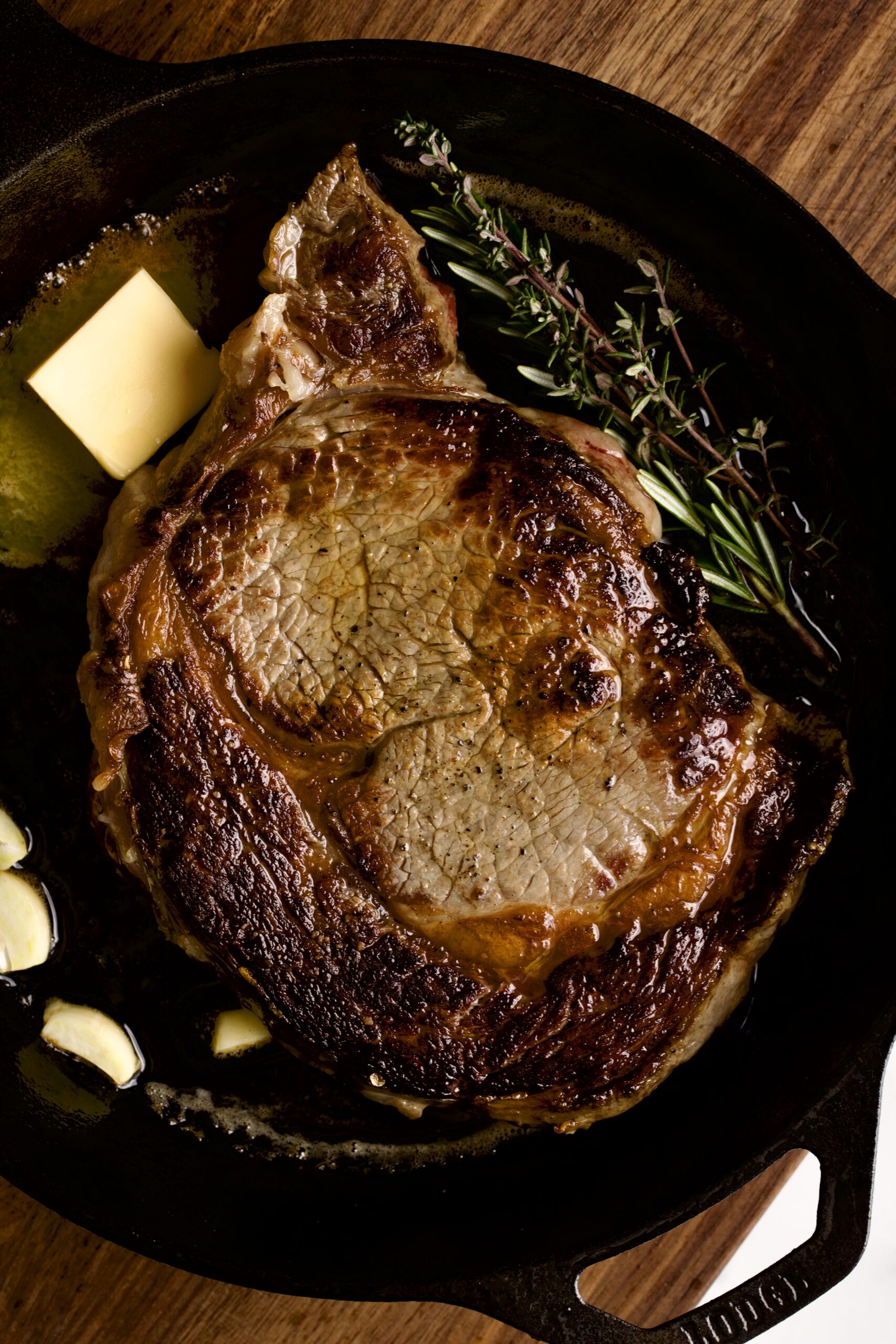
Reduce medium-low heat and add the butter, quartered garlic cloves, thyme, and rosemary to the pan.
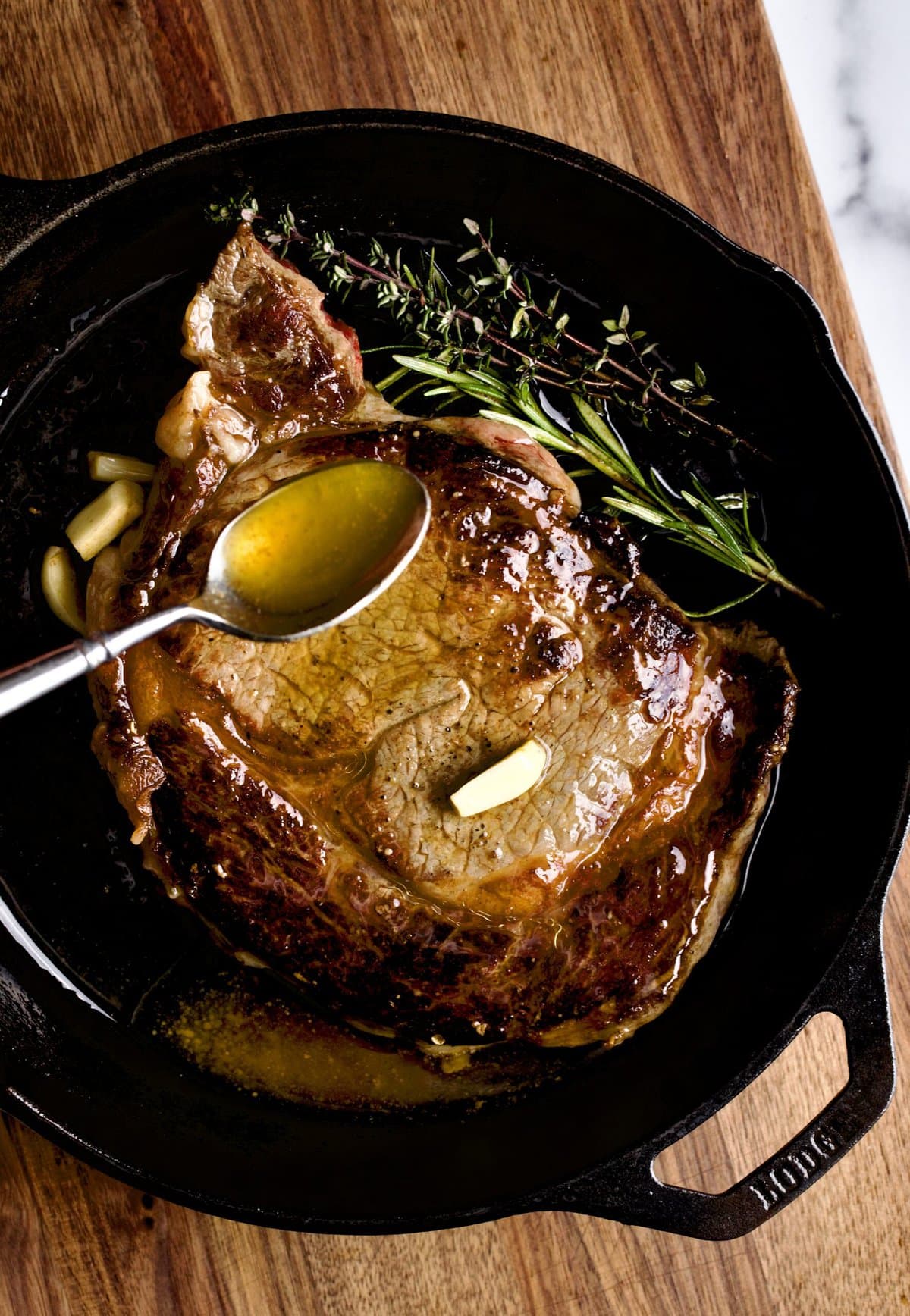
Tilt the pan slightly and spoon the butter sauce over the steak. Continue spooning the melted butter over the steak for a minute or until the steak is about 10 degrees below your desired doneness (the temperature will continue to rise another 10 degrees while the steaks rest). See notes for the cooking temperature guide.
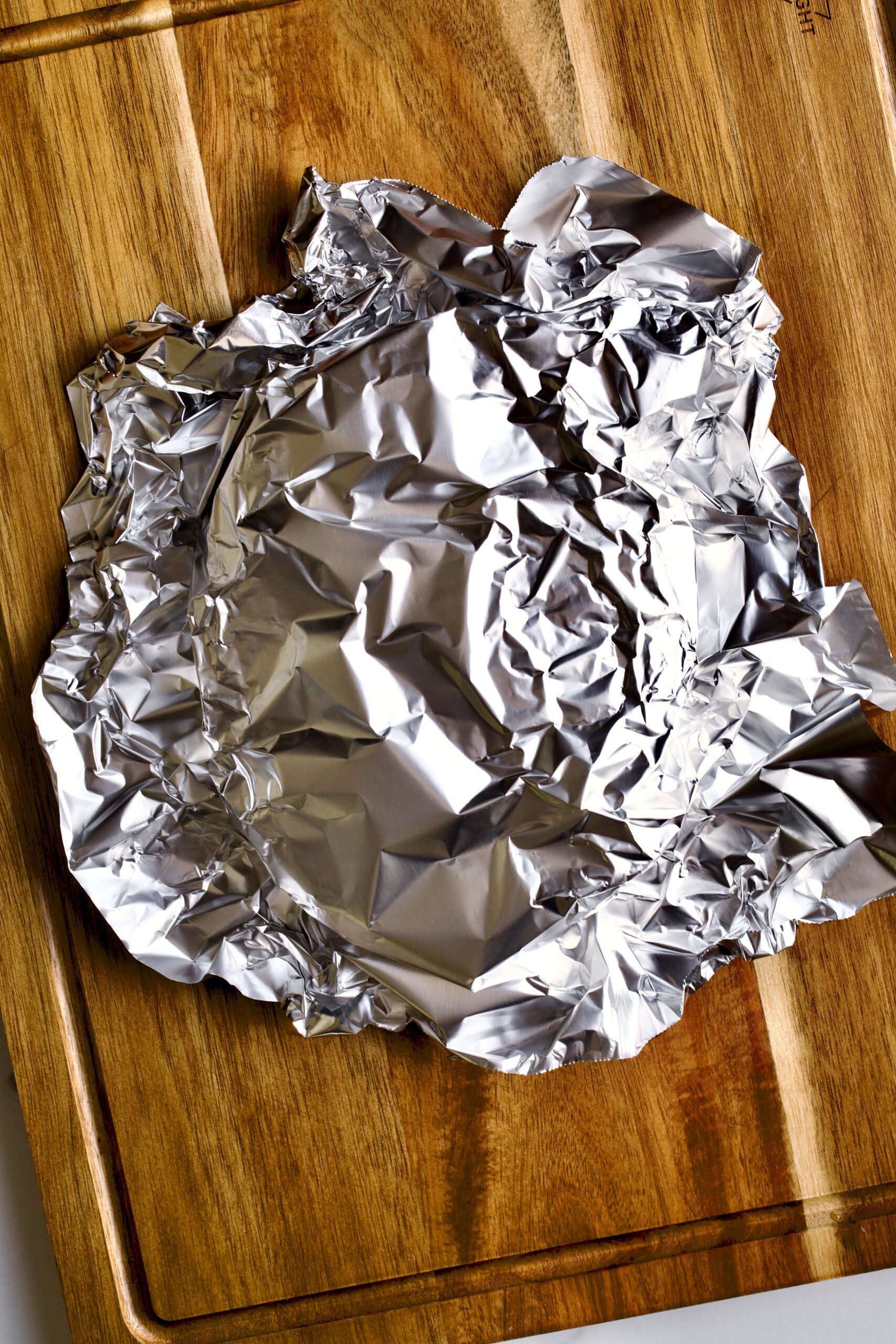
Transfer cooked steak to a cutting board, loosely cover with foil and let rest 15 minutes before slicing.
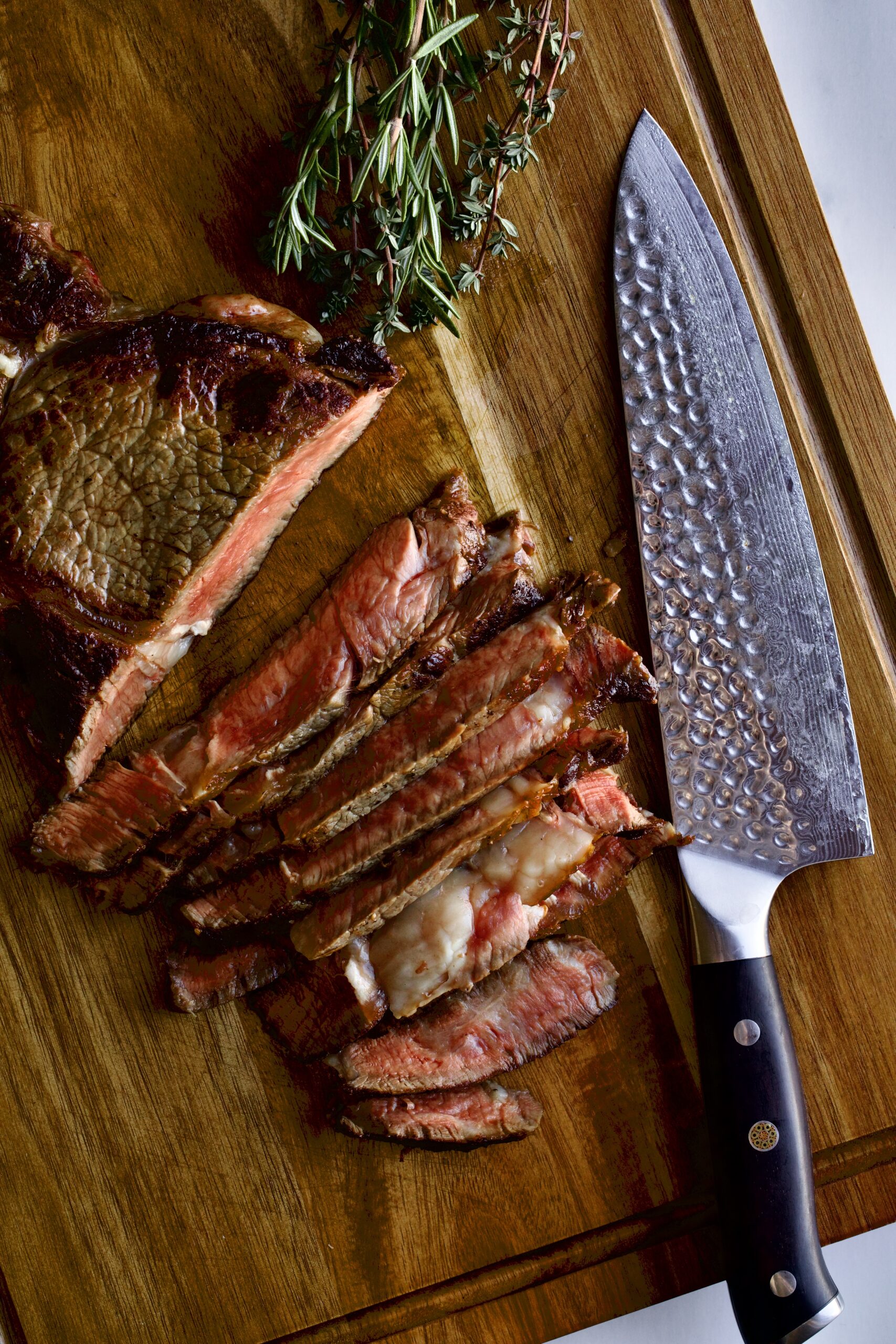
Cut into 1/2″ strips. Serve with the extra butter sauce on the side.
Different Types of Steak
Before starting the cooking process, you must decide on the kind of steak. Here are some options for different cuts of beef to use.
If you want the best quality, get prime or choice grade. For this recipe, I used prime-grade ribeye steak. Any variety of good quality steak will work with this recipe cooking method.
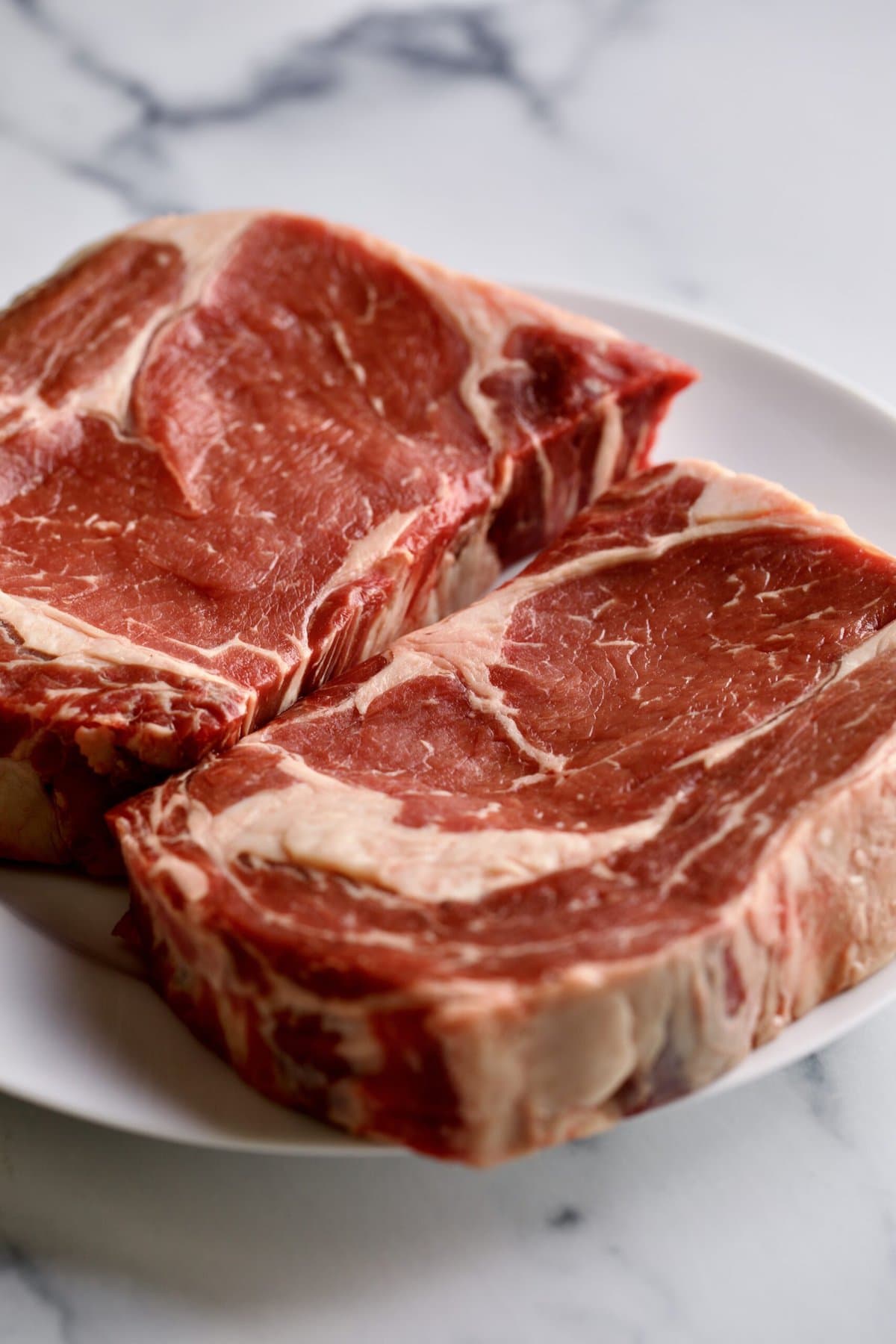
New York Strip Steak (Similar to Sirloin and Porterhouse)-
Perhaps the most popular and widely purchased steaks for grilling and cooking at home. A New Your Strip Steak is usually boneless, with a rectangular cut. It is known for its marbling and deep, rich flavor. It is a bit less tender than a ribeye, but it is still a high-end favorite due to its rich flavor.
Filet Mignon –
Filet Mignon is exceptionally tender because it comes from a muscle called the tenderloin that cows rarely use. It is also one of the most expensive cuts. The filet mignon is widely known for its melt-in-your-mouth texture.
Boneless Ribeye –
A ribeye steak is an excellent choice for the ultimate juicy, beefy flavor. These ultra-flavorful steaks are individually cut prime rib roasts from the cow’s upper rib area. They always have excellent fat marbling and remain super tender. This was my choice of meat for this pan-seared steak recipe.
Bone-in Ribeye –
A bone-in ribeye is the same cut as the boneless. They tend to be larger since they have the bone attached and take more room if cooking on a pan. A bone-in steak has rich flavors of the marrow that will see into the meat during the cooking process, thus enhancing the flavor and juiciness of the steak.
Where to insert instant-read thermometer for steak doneness
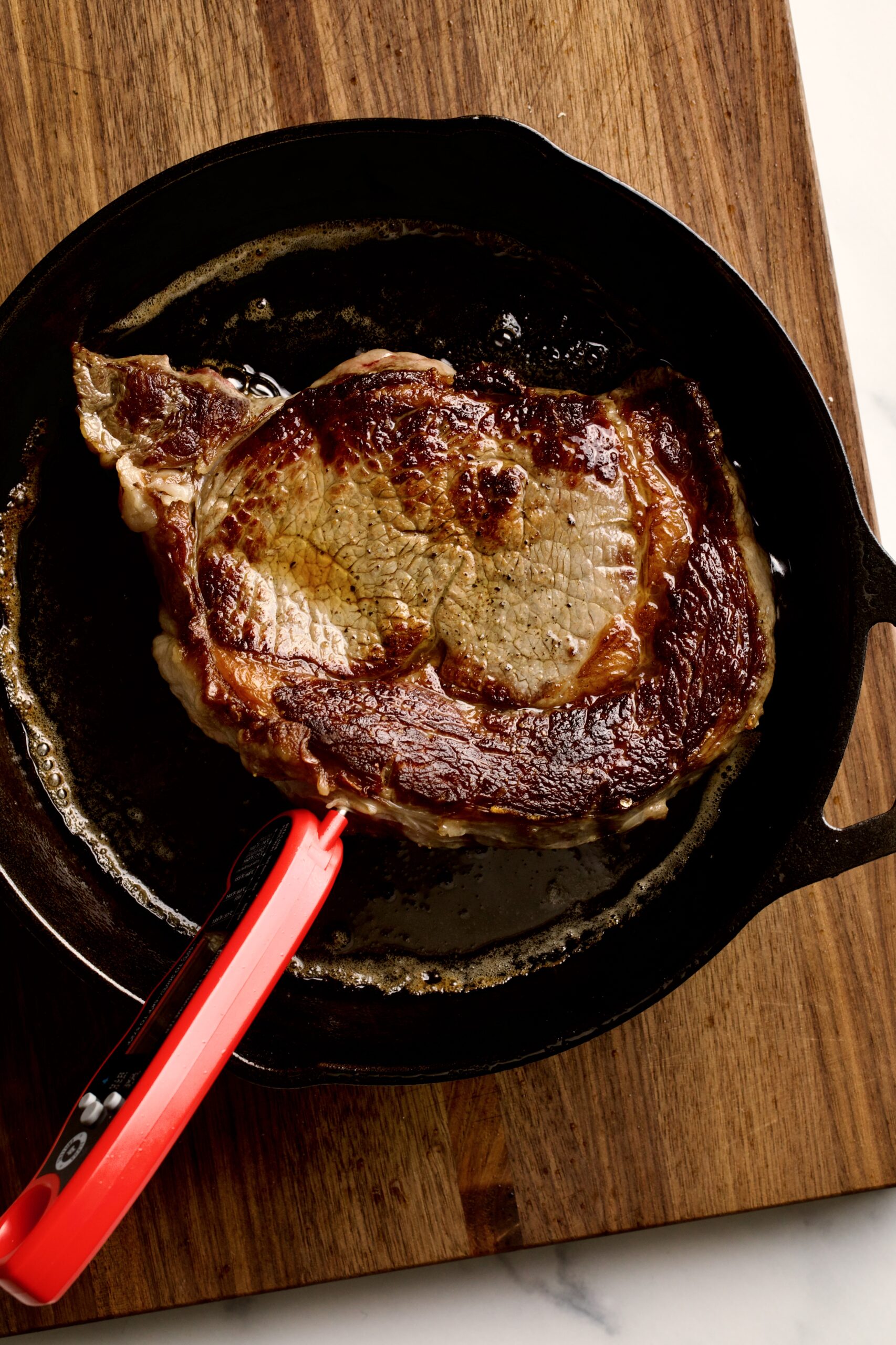
Check the temperature of your steak by using an instant-read thermometer and inserting it horizontally into the side of the steak. You want it to penetrate the thickest part of the center of the steak without touching the bone or fatty parts. This will provide the most accurate temperature reading.
How Long to Cook Steak – Temperature Guide & Cooking Times
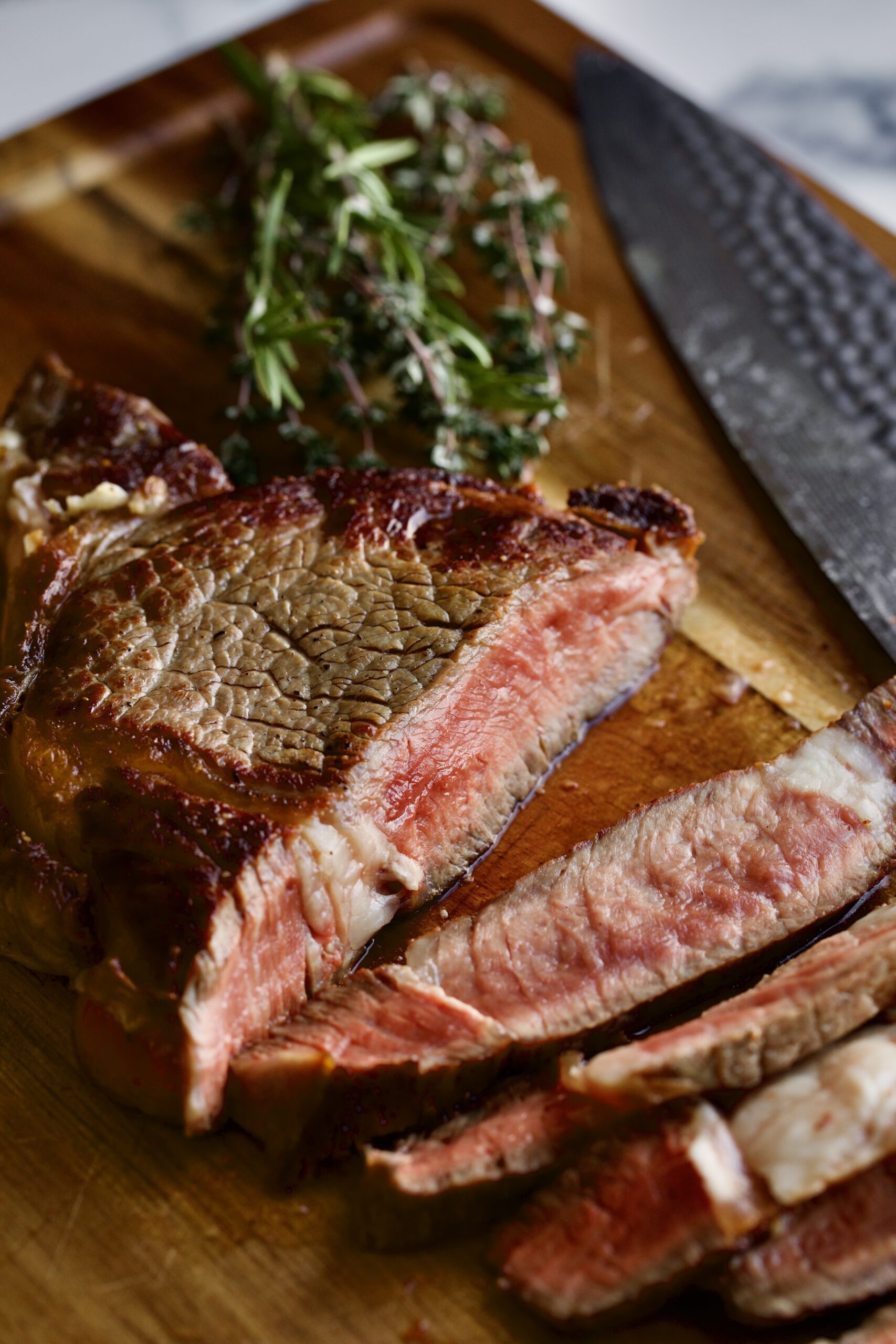
Cook the perfect steak to your personal preference with this temperature and thickness guide. For this recipe, we cook the steak in a pan. You can apply the same doneness guide using a charcoal grill, indoor grill, or gas grill.
Some may prefer the grill marks created on a fire grill, but I love the even sear of cooking the steak on a pan.
Note: *Take the steak off the heat at 10 degrees F before desired doneness temperature. Cover and let rest for 10-15 minutes for carryover cooking.
Filet Mignon and Boneless Ribeye:
Rare 110° To 120° F
1.5″ inch steak, about 3 min on each side
1.75″ inch steak, about 3 1/2 minutes on each side
2″ inch steak, about 4 min on each side
Medium Rare 120° To 130° F
1.5″ inch steak, about 3 1/2 min on each side
1.75″ inch steak, about 4 min on each side
2″ inch steak, about 4 1/2 min on each side
Medium 130° To 140° F
1.5″ inch steak, about 4 min on each side
1.75″ inch steak, about 4 min on each side
2″ inch steak, about 5 min on each side
New York or Sirloin Strip Steak, Bone-In Ribeye Steak, and Porterhouse Steak:
Rare 110° To 120°
1″ inch steak, about 5 minutes on the first side and 3 minutes on the second side
1.5″ inch steak, about 6 minutes on the first side and 4 minutes on the second side
2″ inch steak, about 6 minutes on each side
Medium Rare 120° To 130° F
1″ inch steak, about 4 1/2 minutes on each side
1.5″ inch steak, about 5 minutes on each side
2″ inch steak, about 6 minutes on each side
Medium 130° To 140° F
1″ inch steak, about 6 minutes on the first side and 4 minutes on the second side
1.5″ inch steak, about 7 minutes on each side
2″ inch steak, about 8 minutes on each side
Cooking times and temperatures adapted from Steak University.

Variations
This recipe uses simple flavors to highlight the taste of quality meat. You can get fancy and add different flavors to your liking.
- Use your favorite steak rub.
- Make a compound butter to serve on top of the steak.
- Apply your favorite marinade to the steak an hour or more before cooking.
- Sear on the outside and try finishing in the oven.
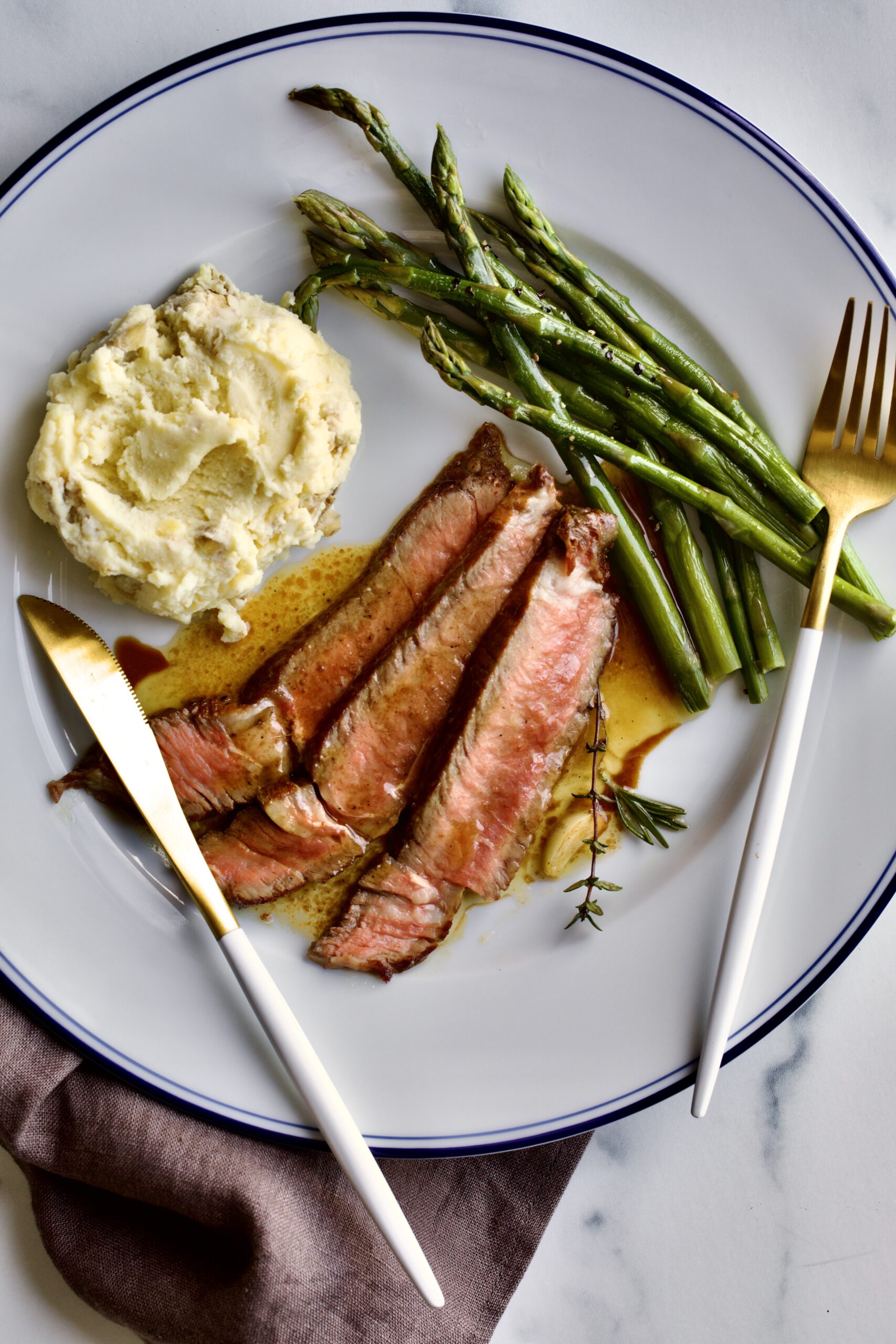
Best Equipment for Cooking Steak on a Pan
Here is the equipment you need to cook steak in a pan.
- Good Meat Thermometer
- Cast iron Skillet (preferred)
- Large heavy-duty stainless steel pan (if using a smaller pan, cook steaks one at a time)
Top Tips for Cooking Steak
- Cook your meat at room temperature– not right out of the fridge. Take the meat out about 30 minutes before cooking.
- Pat dry – use paper towels to pat the steaks dry to get a perfect sear and reduce oil splatter.
- Don’t overcrowd the pan. Depending on the size of your pan and the steak, you want to cook one steak at a time (unless petite filet mignon) with a larger pan 2 at a time is okay. This will keep the temperature consistent, and the steak will cook evenly.
- Make sure the pan is sizzling HOT when you first add the steak to the pan. This will prevent sticking and create a perfect sear and nice crust.
- Avoid touching the steak except to turn it once! It is tempting to check to see if your steak is done on one side, but this only messes up the cooking process. Patience is key to a perfectly cooked steak.
- Cook your steak 10 degrees less than your desired doneness. It will continue cooking after it rests. For example, if you want a medium steak at 140 degrees F, take it off the heat once it reaches 130 degrees F.
- Let your steak REST! After going through all the trouble to cook the perfect steak, this is an essential step. Allow steak to rest for 10 minutes after cooking (under loosely tented foil to keep it warm). This way, the juices can redistribute throughout the steak, making the steak more tender and juicy.
FAQs
Here is a reference guide for cooking steak on a pan. The most critical measurements are internal temperature and thickness rather than an exact time. The cooking time depends on the thickness of your steak and how you like your steak cooked (a medium well steak takes longer than a medium rare steak).
You can use a meat thermometer for a thick cut of steak and a kitchen timer for a thinner cut). Use a kitchen timer for a thin steak (¾ of an inch). A meat thermometer gives a more precise measurement of your steak’s doneness.
Filet Mignon and Boneless Ribeye:
Rare 110° To 120° F
1.5″ inch steak, about 3 min on each side
1.75″ inch steak, about 3 1/2 minutes on each side
2″ inch steak, about 4 min on each side
Medium Rare 120° To 130° F
1.5″ inch steak, about 3 1/2 min on each side
1.75″ inch steak, about 4 min on each side
2″ inch steak, about 4 1/2 min on each side
Medium 130° To 140° F
1.5″ inch steak, about 4 min on each side
1.75″ inch steak, about 4 min on each side
2″ inch steak, about 5 min on each side
Note: *Remove steak from the heat at 10 degrees F before desired doneness temperature. Cover and let rest for 10-15 minutes for carryover cooking. Read the entire blog post for the recipe with all the tips and tricks.
If you aren’t using a meat thermometer you can touch the center of your steaks to check for doneness. This is not the most accurate way, but it is a method you can use as a last resort. A medium rare cook will spring back slightly yet still feel squishy. A medium steak cook will be more springy than squishy.

What to Serve with Pan-Seared Steak
Steak is so versatile! Some favorite sides for making the perfect steak dinner are asparagus, Roasted green beans, Brussels sprouts, Creamy Cauliflower Bake, Crispy Potatoes, Italian Mashed Potatoes, Crips Polenta Fries, and sauteed frozen green beans. Make sure to get some crusty bread for the sauce!
Make it a surf and turf dinner with these recipes: Easy Crab Cakes Recipe (no egg), Easy Saffron Risotto, Classic Lobster Bisque Recipe (Easy), or Crispy Baked Cod with Panko Recipe
Don’t forget Classic Italian Tiramisu Recipe (Authentic) for dessert.
More recipes for you
- BEST Italian Beef Short Rib Ragu
- Classic Italian Spetzzatino (beef and vegetable stew)
- Best Italian-Style Chili Recipe (Beef and Bean)
- Carne Alla Pizzaiola
💙 MADE THIS RECIPE AND LOVED IT? 💙 Please leave a ⭐️STAR rating and COMMENT below- I love connecting with you! Tag me with your creations on Instagram and find me on Pinterest.
Print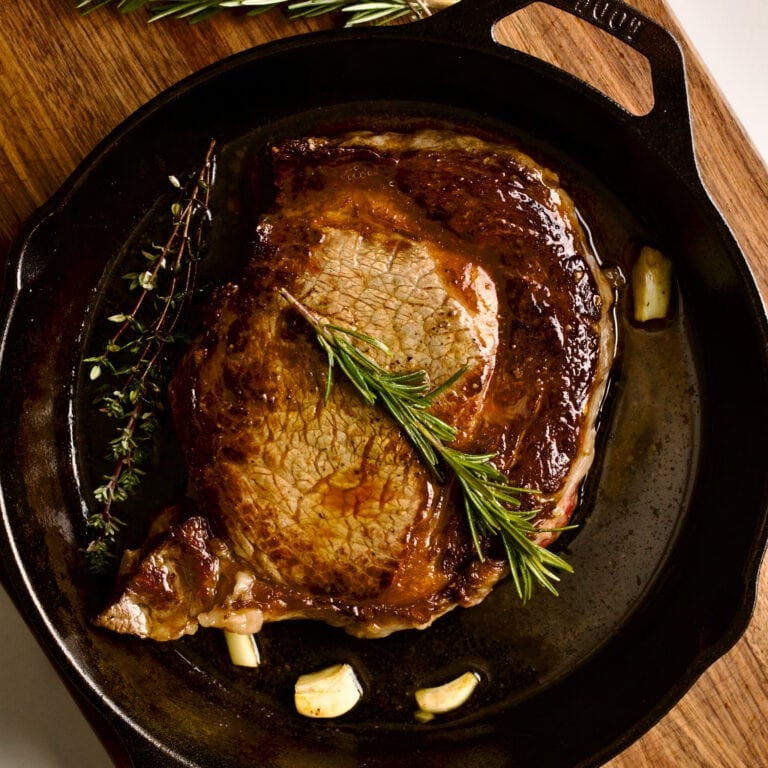
Pan Seared Steak Recipe
How to Cook Steak in a Pan (Perfect Recipe Guide) – If you want a restaurant-quality, perfect steak every time, you’ve landed on the right recipe. Achieve a perfect pan-seared steak with the correct cooking time to achieve your preferred level of doneness. It is cooked with butter, olive oil, garlic, and fresh herbs- the perfect juicy steak!
- Total Time: 20 minutes
- Yield: 4 servings 1x
Ingredients
- 2 steaks (1 lb each) 1.5” thick New York Strip Steaks, Ribeye, or Top Sirloin Steaks (preferably choice or prime grade)
- 1 tablespoon extra light olive oil
- 1 1/2 teaspoons kosher salt
- 1 teaspoon black pepper, freshly ground
- 2 tablespoons butter
- 2 cloves garlic, peeled and quartered
- 2 sprigs of fresh rosemary
- 2 sprigs of fresh thyme
Instructions
- Rest the steaks at room temperature for 30 minutes. Thoroughly pat the steaks dry with a paper towel. Just before cooking, generously season with salt and pepper.
- Heat the cast iron pan until hot, then add the olive oil over medium-high heat, swirling to coat the pan. Ensure the oil is hot before adding the steaks to the skillet. If using a smaller pan, cook steaks one at a time and use half of the butter, olive oil, and herbs for each one. Otherwise, cook in the same pan. Sear the steaks on the first side for 4 minutes until a brown crust has formed, then flip and cook another 3-4 minutes. Using tongs, turn the steak on its sides to sear the fat edges and sides of the steak (1-minute per edge).
- Reduce medium-low heat and add the butter, quartered garlic cloves, thyme, and rosemary to the pan. Tilt the pan slightly and spoon the butter sauce over the steak. Continue spooning the melted butter over the steak for a minute or until the steak is about 10 degrees below your desired doneness (the temperature will continue to rise another 10 degrees while the steaks rest). See notes for the cooking temperature guide.
Notes
Where to insert instant-read thermometer for steak doneness
Check the temperature of your steak by using an instant-read thermometer and inserting it horizontally into the side so it penetrates the thickest part of the center of the steak (without touching the bone).
Top Tips for Cooking Steak
- Cook your meat at room temperature– not right out of the fridge. Take the meat out about 30 minutes before cooking.
- Pat dry – use paper towels to pat the steaks dry to get a perfect sear and reduce oil splatter.
- Don’t overcrowd the pan. Depending on the size of your pan and the steak, you want to cook one steak at a time (unless petite filet mignon) with a larger pan 2 at a time is okay. This will keep the temperature consistent, and the steak will cook evenly.
- Make sure the pan is sizzling HOT when you first add the steak to the pan. This will prevent sticking and create a perfect sear.
- Avoid touching the steak except to turn it once! It is tempting to check to see if your steak is done on one side, but this only messes up the cooking process. Patience is key to a perfectly cooked steak.
- Cook your steak 10 degrees less than your desired doneness. It will continue cooking after it rests. For example, if you want a medium steak at 140 degrees F, take it off the heat once it reaches 130 degrees F.
- Let your steak REST! After going through all the trouble to cook the perfect steak this is an essential step. Allow steak to rest for 10 minutes after cooking (under loosely tented foil to keep it warm). This way, the juices can redistribute throughout the steak, making the steak more tender and juicy.
Steak Cooking Guide
Note: *Take the steak off the heat at 10 degrees F before desired doneness temperature. Cover and let rest for 10-15 minutes for carryover cooking.
Filet Mignon and Boneless Ribeye:
Rare 110° To 120° F
1.5″ inch steak, about 3 min on each side
1.75″ inch steak, about 3 1/2 minutes on each side
2″ inch steak, about 4 min on each side
Medium Rare 120° To 130° F
1.5″ inch steak, about 3 1/2 min on each side
1.75″ inch steak, about 4 min on each side
2″ inch steak, about 4 1/2 min on each side
Medium 130° To 140° F
1.5″ inch steak, about 4 min on each side
1.75″ inch steak, about 4 min on each side
2″ inch steak, about 5 min on each side
New York or Sirloin Strip Steak, Bone-In Ribeye Steak, and Porterhouse Steak:
Rare 110° To 120°
1″ inch steak, about 5 minutes on the first side and 3 minutes on the second side
1.5″ inch steak, about 6 minutes on the first side and 4 minutes on the second side
2″ inch steak, about 6 minutes on each side
Medium Rare 120° To 130° F
1″ inch steak, about 4 1/2 minutes on each side
1.5″ inch steak, about 5 minutes on each side
2″ inch steak, about 6 minutes on each side
Medium 130° To 140° F
1″ inch steak, about 6 minutes on the first side and 4 minutes on the second side
1.5″ inch steak, about 7 minutes on each side
2″ inch steak, about 8 minutes on each side
- Prep Time: 5 min
- Cook Time: 15 minutes
- Category: Savory
- Method: Italian
- Cuisine: Italian
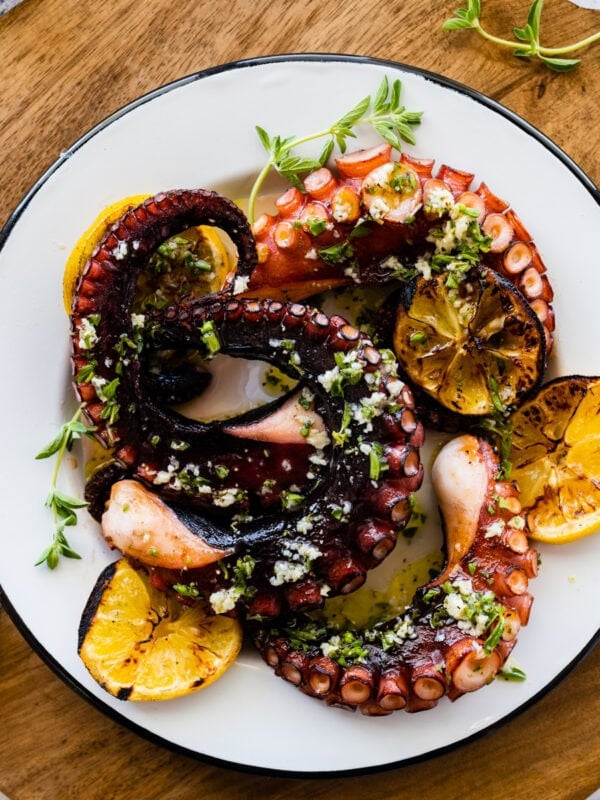

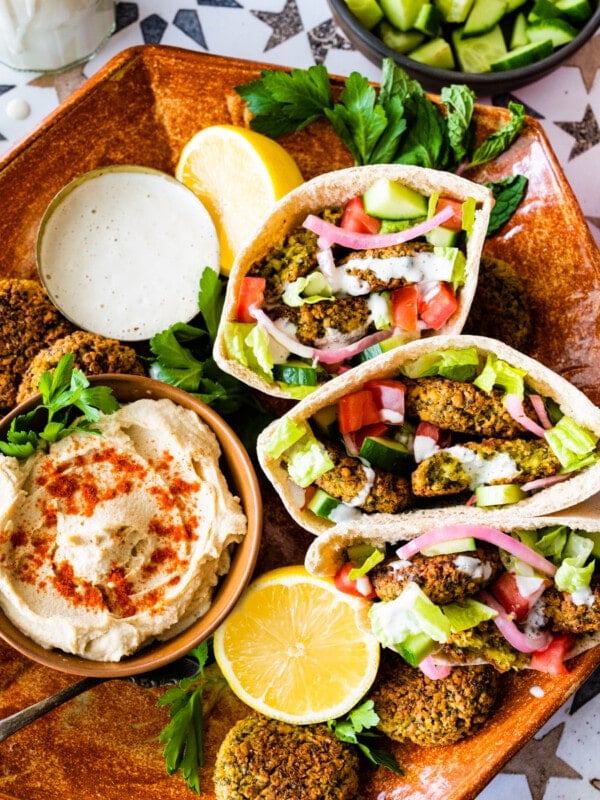
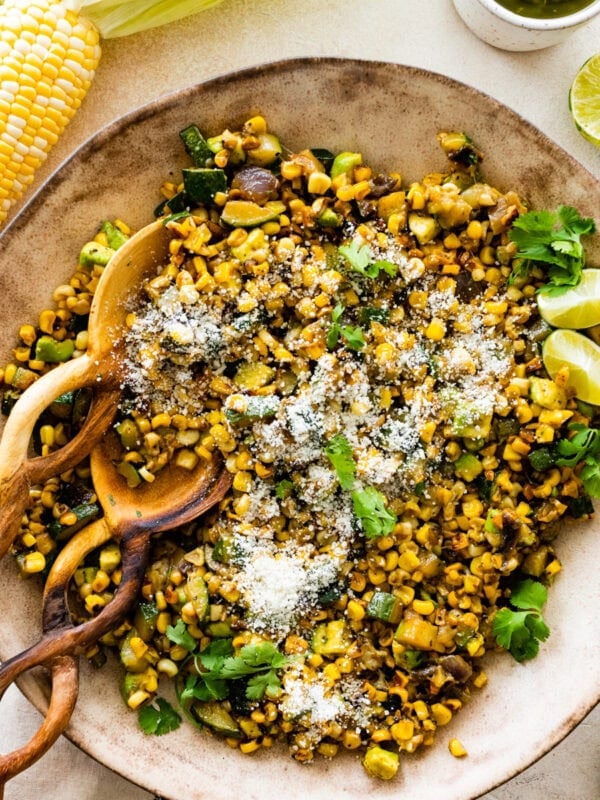




I love the detailed information in the doneness guide. The butter, garlic, and herbs are perfect. Thank you!
Thank you!!
This recipe is doable and delicious! Juicy, tender steak cooked to perfection!